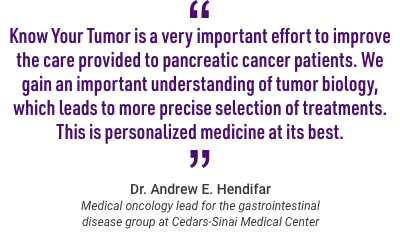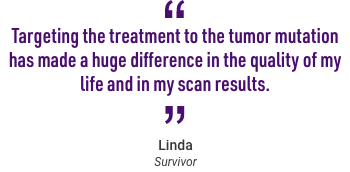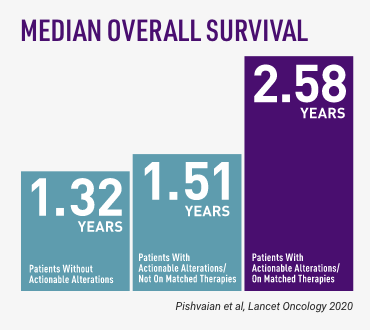Patients who receive treatment based on their biology can live longer.
PanCAN's Know Your Tumor service provides eligible patients with information about their tumor's biology through free tissue biomarker testing and genetic testing for inherited mutations. Using this information, Know Your Tumor also gives patients and their healthcare team access to personalized treatment recommendations, including available clinical trials, based on tumor biology. This approach, which uses a patient's tumor or genetic makeup to guide treatment decisions, is known as precision medicine.
Best way to get started?
Contact PanCAN Patient Services for more information about Know Your Tumor and to help you determine if the service is right for you.
How Know Your Tumor Works
Resources


Every pancreatic cancer patient is different. Patients who receive treatment based on their biology can live longer. The Pancreatic Cancer Action Network strongly recommends all pancreatic cancer patients get genetic testing for inherited mutations as soon as possible after diagnosis and biomarker testing of their tumor tissue to help determine the best treatment options.
Learn More About Precision Medicine
- What is Precision Medicine?
- Why is Precision Medicine Important?
- Who Should Consider Precision Medicine?
- How Do I Know If I've Had Tumor Biomarker Testing?
- When Should I Get Testing?
- How Do I Get Testing for Precision Medicine?
What is Precision Medicine for Pancreatic Cancer?
Precision medicine is treatment based on your biology.
Biomarker testing of tumor tissue reveals your tumor's biology, such as genes and proteins within the tumor. Genetic testing for inherited mutations shows mutations (changes) you were born with.
This information can help your doctor identify treatments based on your individual tumor biology.
Patients should discuss both tests with their care team. The tests can be available through their treating institution or PanCAN's Know Your Tumor® precision medicine service.
What Is Biomarker Testing?
Biomarker testing of tumor tissue tells you about the biology of your tumor. It is also sometimes called molecular profiling, tumor testing or genomic testing. A tissue sample is collected through a biopsy and analyzed. It can show changes in the tumor's genes or proteins. Your doctor may be able to use this information to make treatment decisions.
What Is Genetic Testing for Inherited Mutations?
Genetic testing looks for inherited mutations. You may have been born with inherited mutations even if you don't have a family history of cancer.
The alterations to a person's DNA are the same throughout their whole body. So, this analysis is usually done on a blood or saliva sample.
Like knowing the changes in your tumor, knowing the changes present in all the cells in your body can also help you and your healthcare team make treatment decisions.
Back to top
Why Is Precision Medicine Important for Pancreatic Cancer Patients?
- Patients who receive treatment based on their biology can live longer.
- All pancreatic cancer patients are different, and treatment that works well for one person may not work as well for someone else.
- Many factors influence a person's response to treatment, including age, stage of diagnosis, your biology and the tumor's biology.
- Knowing the alterations in your tumor or throughout your body can help you and your healthcare team select treatment options, including clinical trials, that are likely to work best for you. These treatments may not have been considered otherwise.
- Precision medicine also benefits future patients. Researchers are studying precision medicine to discover new information about tumors and treatments that can help even more patients.


The Pancreatic Cancer Action Network strongly recommends that all pancreatic cancer patients get tumor biomarker testing and genetic testing for inherited mutations as soon as possible after diagnosis to help determine the best treatment options.
Back to top
How Do I Know if I've Had Tumor Biomarker Testing?
Your doctor may have done several tests on your tumor, so it is important to know if one of those tests was biomarker testing.
- Ask your doctor if biomarker testing has been performed on your tumor and if they have used the results to make a treatment decision.
- PanCAN Patient Services can help explain different types of pancreatic cancer testing.
- If you've already had biomarker or genetic testing, PanCAN Patient Services can help you understand your results and give you information on treatment options, including clinical trials.
Back to top
When Should I Get Testing?
Pancreatic cancer patients should get tumor biomarker testing and genetic testing as early as possible after diagnosis. However, testing can happen at any time.
Because tissue is needed to perform tumor biomarker testing, a doctor must determine the best way to collect a sample. If you are having your tumor surgically removed, tissue from the surgery may be used. In most other cases, a specific type of biopsy, called a core biopsy, is needed.
If you are currently on treatment, you can get testing at the same time so that you have the information if you need to make a future treatment decision.
Back to top
How Do I Get Testing for Precision Medicine?
Your doctor or hospital may offer testing, especially if you are seen at a high-volume center. Get resources through PanCAN Patient Services to help you talk to your doctor. If you can't get testing through your doctor or hospital, consider our Know Your Tumor precision medicine service.
Back to top
More About Precision Medicine
Contact PanCAN Patient Services
Loading...









